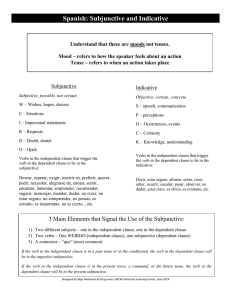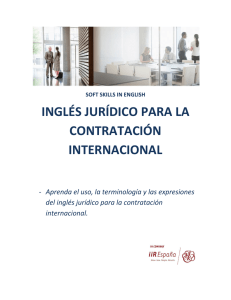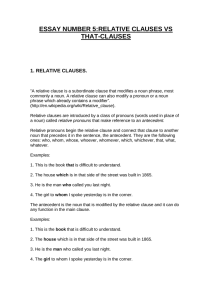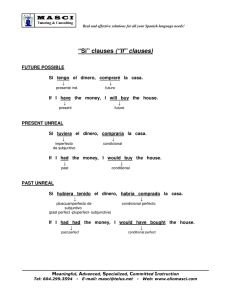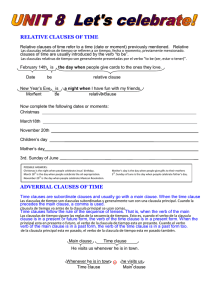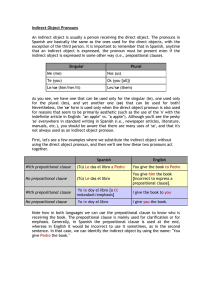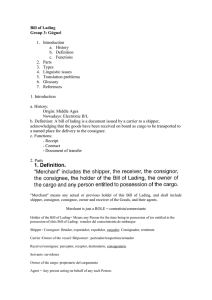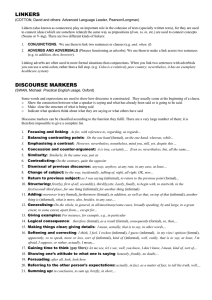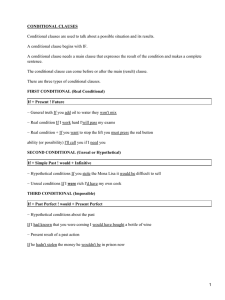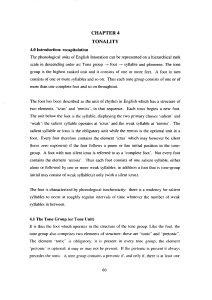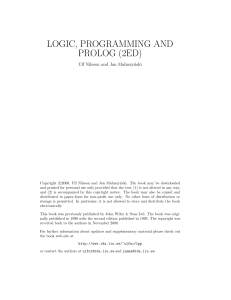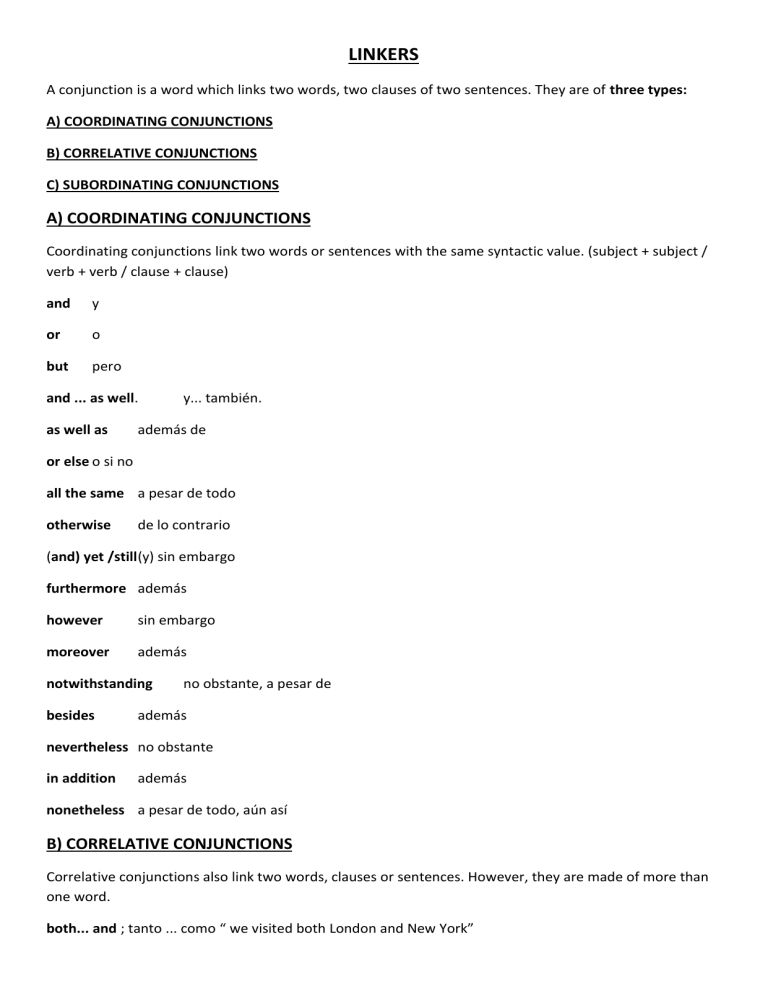
LINKERS A conjunction is a word which links two words, two clauses of two sentences. They are of three types: A) COORDINATING CONJUNCTIONS B) CORRELATIVE CONJUNCTIONS C) SUBORDINATING CONJUNCTIONS A) COORDINATING CONJUNCTIONS Coordinating conjunctions link two words or sentences with the same syntactic value. (subject + subject / verb + verb / clause + clause) and y or o but pero and ... as well. as well as y... también. además de or else o si no all the same a pesar de todo otherwise de lo contrario (and) yet /still (y) sin embargo furthermore además however sin embargo moreover además notwithstanding besides no obstante, a pesar de además nevertheless no obstante in addition además nonetheless a pesar de todo, aún así B) CORRELATIVE CONJUNCTIONS Correlative conjunctions also link two words, clauses or sentences. However, they are made of more than one word. both... and ; tanto ... como “ we visited both London and New York” not only... but ... also ... - not only... but ... too. / as well. no sólo ... sino también ... “Not only Laura but also John cooked the dinner! When NOT ONLY is first, there is an inversion in the order of the sentence: Not only does he love her, but also respects her. Not only does he love her, but respects her too / as well. either... or o ... o “We could either fly or go by train” neither... nor ni ... ni “she is neither friendly nor co-operative” BE CAREFUL!!! When two subjects are linked, the verb has the person of the subject which is closest to it: Neither he nor his friend is ready. Neither his friends nor he is ready. Neither he nor his friends are ready. C) SUBORDINATING CONJUNCTIONS They are also called adverbial clauses. They tell you how, when, or why the action in the main clause takes place. They may be grouped in the chart below, under the following headings and with the main conjunctins that introduce them. There are 9 types of adverbial clauses: 1. PURPOSE. They express the purpose or the finality of the main clause. to + verb in infinitive “they studied to pass to exam” in order (not) to + verb in infinitive “He called in order to remind me the meeting” so as (not) to + verb in infinitive “Will he lend you money so as to buy the tickes?” in order that + sentence “I’ve brought this watch in order that your father fix it up” so (that) + sentence “ They studied hard so that they learn French” so + adjective / adverb + that + sentence for fear of + verb with -ing / noun “The bus was so fast (that) we were twenty minutes early” “He didn't ask the results for fear of having failed” for fear that + sentence “For fear that I forgot it, I wrote it down” in case + sentence “ They made notes in case they forgot anything” Only IN ORDER TO and SO AS TO are to be used in NEGATIVE sentences: He came in quietly in order not to / so as not to wake the child. He is leaving the room in order not to / so as not to have a row. 2. CAUSE They express the reason of the main clause For + clause “I called him at work, for I had to tell him something important” Because+ clause “He was angry because we had lost our keys” Because of + noun phrase “he didn’t go the party because of his illness” + gerund “he didn’t go to the party because of feeling ill” Due to + noun phrase “classes were cancelled due to heavy snow” + the fact that “ classes were cancelled due to the fact that it was snowing” Since + clause “We went shopping since he had no food at home” As + clause ( it has initial position) “As you have no key, you will have to come home early.” 3. COMPARISON They indicate a comparison. Than + clause “ they played better than we thought” as + adjective / adverb + as “he is as wise as his mother” not as / so + adjective / adverb + as “he is not as tall as his father” as much + uncountable noun + as “he spends as much money as he earns” as many + countable noun + as the same + noun + as “We didn’t invite as many friends as we did in our last party” “he doesn’t have the same temper as his brother” 4. TIME. It expresses the time when the action is done After + clause “ I’ll leave after the rain stops” After + gerund “after finishing my studies, I returned home” As + clause “He met his sister as he was leaving the house” as soon as + clause “ He told it to me as soon as he knew it” before + clause “She had studied English before she came to London” before + gerund “Before studying the exam, the teacher explained the exercises” once + clause “I’ll tell you once I know it” since + clause “ I have not seen him since we graduated” till / until + clause “I will not leave until you arrive” when + clause “he prepared the dinner when he had finished talking on the phone” while / whilst (UK) + clause “Don’t disturb me while I am studying” 5. RESULT. They express the result of an action so + adjective / adverb + that “The ice-cream was so good that we had another one” so much that + clause “ he works so much that he never has time for his baby” so many that + clause “There are so many that we should leave” such a + adjective + singular noun + that “She is such a nice girl that she has plenty of friends” such + adjective + plural noun / uncountable noun + that “He walks at such a fast pace that nobody can follow him” 6 CONCESSION. They express an objection or difficulty Although + clause ( At the beginning of the sentence) “although the were very tired, they worked hard” Though + clause (in any place) “I won’t be abe to go, though I have the ticket even if + subjunctive “even if I am tired, I will go out with you” even though + indicative “Even though I have enough money, I will not buy a new computer” in spite of / despite + gerund “Despite being rich, he is selfish” + noun phrase “Despite his richness, he is selfish” + the fact that + clause “Despite the fact that he is rich, he is selfish” however + adj. / adv. “The Lakers won’t call you however tall you are” no matter how, when, where... “no matter where he was, he always did what he wanted” whatever + clause “Tell me the truth whatever it is” whether + clause + or not “ you have to help your mother whether you like it or not” whereas + clause “ I like skiing whereas my wife does not like it all” 7. CONDITIONAL. They express a condition for the compliance of the main clause. If + clause unless + clause “Unless he was very upset, he would call” provided (that) + clause “You may go the ball, provided that you arrive at midnight” providing (that) + clause “ You may attend the party, providing that you bring some wine” as / so long as + clause “He can come as long as he keep quiet” on (the) condition (that) + clause “I have given you some money on the condition that you give it back to me next month” but for + noun “he could have got hurt but for his fast reflexes” assuming (that) + clause “ Assuming that you met him, you should have talked to him” in case + clause “Give me his phone number in case I need it” supposing (that) + clause “ Supposing that he asked you for help, would you agree? 8. MANNER. They indicate the way something is done. As + clause “Do it as you decide” as if + clause “ She looks as if she was having a problem” as though + clause “it sounds as though someone was crying” like (US) + clause (informal) “she looks like she has had an argument”
